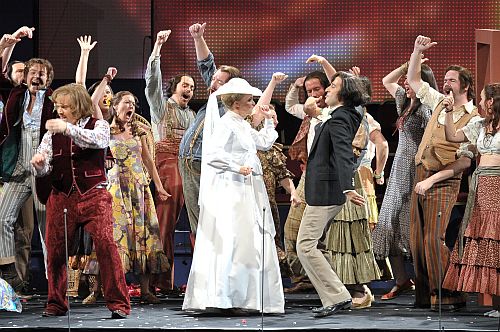Mozart, Le Nozze di Figaro (complete) Soloists,Glyndebourne Festival Chorus; Orchestra of the Age of Enlightenment/Robin Ticciati, Royal Albert Hall, London, 28.8.2011. (CC)

Figaro-Vito Priante
Susanna- Lydia Teuscher
Countess Almaviva- Sally Matthews
Count-Almaviva Audun Iverson
Bartolo-Andrew Shore
Marzellina-Ann Murray
Cherubino -Isabel Leonard
Don Basilio-Alan Oke
Antonio-Nicholas Folwell
Don Curzio-Colin Judson
Barbarina-Sarah Shafer
First Bridesmaid-Ellie Laugharne
Second Bridesmaid-Katie Bray
Stage Director-Ian Rutherford
The Glyndebourne visit to the Proms is always eagerly awaited. Mozart’s Figaro was in fact the first opera to be performed at Glyndebourne (1934), while in 1994 it inaugurated the new opera house. I am sure many record collectors cherish, as I do, the famous 1934 Fritz Busch Glyndebourne recording (currently a steal on Naxos). The Proms/Glyndebourne/Figaro confluence has in fact surfaced previously on a number of occasions (conductors include John Pritchard and Bernard Haitink). The use of period performance gave this account, under the vibrantly young Robin Ticciati, an edge that enabled it to, in general, fizz along nicely. There was certainly plenty to enjoy: indeed, the first act promised a performance of the very first rank. If this promise was not fully fulfilled by the end of the evening, this remained a notable performance that showcased some young talent as well as reminding us of the strengths of some established names.
The overture set the scene not only for the mood of the opera as a whole but also for the excellence of the orchestral contributions. It sparkled as it truly should, bustling and full of not only momentum but also the promise of shenanigans and japes. The vibrato-free strings set the stall for the authentic slant of the reading, a reading that didn’t dawdle but which didn’t sound rushed either. Robin Ticciati has clearly spent much time considering this score, and the result was an almost balanced evening in which orchestral detail was a near constant source of delight.
The “stage” was the platform above the orchestra, where the Glyndebourne production was acted out. Ian Rutherford was responsible for the deft transfer of Michael Grandage’s Glyndebourne production (costumes indicate the 1960s?). Comedy was certainly a major ingredient, and the farce element highlighted: characters” hiding” under a flowerpot, that sort of thing. That it comes from a stage run was attested to by the slickness of movement over the stage space and the keen banter of the recitatives. The use of disco dancing in Mozart is getting old hat now, though. It worked well in Calixto Bieito’s Don Giovanni over at ENO a few years ago (the production is available on DVD, taken from the Liceu) but here I found myself rather unimpressed, as if someone were telling me a joke I’d heard before.
Figaro himself was tackled by the Neapolitan baritone Vito Priante, who gave a focused account (“Non più andrai” was a particularly memorable moment). His diction, too, was crisp. His emotional highlight came towards the end with his poignant “Pace, pace, mio dolce tesoro” (addressed to Susanna). The Count, the Norwegian Audun Iversen, making his Proms debut, bore a striking and possibly not unwelcome (in the context of the plot) resemblance to Keith Lemon (of the TV show Celebrity Juice). He has sung the role of Almaviva before (Royal Danish Opera). Just occasionally he seemed to slip out of the part and to lose his identification with his character. He was able to sport a wonderfully dandyish burgundy number for the third act, which seemed to chime in with his deliberate exaggeration in the third act “Ha! Già vinta la causa!”
Sally Matthews has a well established career. There are, in fact, plans for her to sing the Countess for Covent Garden, and on present evidence it will be a fine assumption of the role. She absolutely shone in her major arias (tremendous legato in the gorgeous outpouring that was “Porgi amor”; ditto in “Dove sono”). But she also excelled in ensemble work, too (No. 14, Terzetto, the Count, Countess and Susanna, while her vocal agility in the Act 2 finale was remarkable).
The name Lydia Teuscher (Freiburg born, studied at the Royal Welsh College of Music and Drama) was new to me. Teuscher was a superb Susanna (her “Venite … ingincchiatevi” was beautifully tender and light, her phrasing throughout was consistently thoroughly Mozartian and a source of delight). Her final act Recitative and Aria (“Giunse alfin … Deh vieni, non tardar”) was her true moment in the spotlight. It was performed to silence from the near capacity audience.
Baritone Andrew Shore is a much-loved, great character actor as well as a fine singer, of course, so his Bartolo promised much. Vocally he was not as fine as I have heard him in the past, his voice seeming in less than full bloom, but his “Vendetta” aria was memorable for his sure way with the text and dramatic situation. Mezzo Ann Murray is another singer who is big on character, and so it transpired for her deft delivery of Marcellina, and as the opera progressed so did the stature of her performance. The tenor Alan Oke was a simply superb Don Basilio, his voice beautifully toned and expressive
American soprano Sarah Shafer, who at a mere 23 years old was making her Proms debut as Barbarina; the Glyndebourne production had marked her professional debut, in fact. She perfectly projected all the life and vim of a pretty young girl, yet managed a certain poignancy at the outset of the final act as she searched for the pin. Nicholas Folwell made absolutely the most of the role of Antonio, fleshing it out to the fullest.
The Glyndebourne Chorus, as usual, excelled in their contributions. The high reputation of Glyndebourne Mozart continues.
Colin Clarke